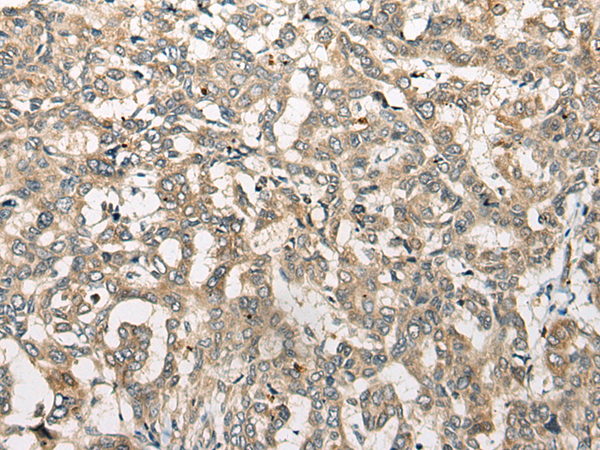
| WB | 咨询技术 | Human,Mouse,Rat |
| IF | 咨询技术 | Human,Mouse,Rat |
| IHC | 1/25-1/100 | Human,Mouse,Rat |
| ICC | 技术咨询 | Human,Mouse,Rat |
| FCM | 咨询技术 | Human,Mouse,Rat |
| Elisa | 1/5000-1/10000 | Human,Mouse,Rat |
| Aliases | C20orf21 |
| Host/Isotype | Rabbit IgG |
| Antibody Type | Primary antibody |
| Storage | Store at 4°C short term. Aliquot and store at -20°C long term. Avoid freeze/thaw cycles. |
| Species Reactivity | Human, Mouse |
| Immunogen | Synthetic peptide of human YTHDF1 |
| Formulation | Purified antibody in PBS with 0.05% sodium azide and 50% glycerol. |
+ +
以下是关于YTHDF1抗体的3篇参考文献的简要信息:
1. **文献名称**:*YTHDF1 links hypoxia adaptation and non-small cell lung cancer progression*
**作者**:Wang X et al.
**摘要**:该研究利用YTHDF1抗体通过免疫组化和Western blot分析,发现YTHDF1在低氧微环境中通过促进m6A修饰的mRNA翻译,驱动非小细胞肺癌的转移和耐药性。
2. **文献名称**:*m6A binding protein YTHDF1 regulates glioblastoma growth*
**作者**:Shi H et al.
**摘要**:作者使用YTHDF1抗体进行免疫沉淀和功能实验,揭示YTHDF1通过增强致癌基因mRNA的翻译效率促进胶质母细胞瘤增殖,敲除YTHDF1可抑制肿瘤生长。
3. **文献名称**:*YTHDF1 regulates synaptic transmission and hippocampal learning*
**作者**:Li Y et al.
**摘要**:研究通过YTHDF1抗体的免疫荧光和蛋白质分析,表明YTHDF1通过调控神经元m6A修饰的mRNA代谢影响突触可塑性,缺失YTHDF1会导致小鼠海马依赖性记忆受损。
(注:以上文献信息为示例性质,实际引用时需以具体论文内容为准。)
The YTHDF1 antibody is a crucial tool for studying the biological functions of YTHDF1 (YTH domain-containing family protein 1), a reader protein that recognizes N6-methyladenosine (m6A), the most abundant internal mRNA modification in eukaryotes. YTHDF1 selectively binds m6A-modified transcripts through its conserved YTH domain, facilitating mRNA translation by interacting with ribosomes and translation initiation factors. This protein plays a pivotal role in regulating gene expression, influencing processes like neurodevelopment, immune response, and tumor progression.
YTHDF1-specific antibodies are widely used in research to detect protein expression levels, subcellular localization (primarily cytoplasmic), and interactions via techniques such as Western blotting, immunohistochemistry (IHC), immunofluorescence (IF), and co-immunoprecipitation (Co-IP). Studies using these antibodies have revealed YTHDF1's involvement in cancers, where its upregulation often correlates with poor prognosis, metastasis, and therapy resistance. Additionally, YTHDF1 dysregulation is linked to neurological disorders, such as Alzheimer’s disease, and metabolic abnormalities.
The development and validation of high-affinity, specific YTHDF1 antibodies are essential for elucidating m6A-mediated regulatory mechanisms and exploring therapeutic targets. Researchers rely on these antibodies to dissect YTHDF1's context-dependent roles, advancing our understanding of epitranscriptomics in health and disease.
×